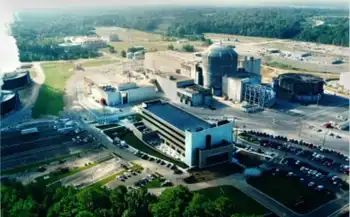Phase 2 biomass testing at Nanticoke begins
OPG is currently testing the use of biomass as a new energy source for Ontario. Biomass used in OPG's program consists primarily of wood pellets and agricultural by-products such as grain screenings and milling spoils that can be burned to generate electricity.
OPG does not use food crops in its biomass program. Biomass is considered to be "carbon neutral", meaning the amount of carbon released when burned is equal to the amount removed from the atmosphere when being grown.
"We continue to look for opportunities to reduce the impact of our station on the environment," said Nanticoke GS Plant Manager Frank Chiarotto. "Co-firing coal with biomass could provide us with an option to reduce our environmental footprint. The Phase 2 test program is a significant milestone as it will involve longer duration test burns".
To date, OPG's Nanticoke Generating Station has successfully co-fired milling by-products with coal to produce over 1.3 million kilowatt-hours of electricity; enough power to meet the energy needs of 1,300 Ontario homes for one month.
Ontario Power Generation is an Ontario-based electricity generation company whose principal business is the generation and sale of electricity in Ontario. Our focus is on the efficient production and sale of electricity from our competitive generation assets, while operating in a safe, open and environmentally responsible manner.
Related News

NRC Begins Special Inspection at River Bend Nuclear Power Plant
WASHINGTON - The Nuclear Regulatory Commission has begun a special inspection at the River Bend nuclear power plant to review circumstances related to the failure of five portable emergency diesel generators during testing. The plant, operated by Entergy Operations, is located in St. Francisville, La.
The generators are used to supply power to plant systems in the event of a prolonged loss of off-site electrical power coupled with a failure of the permanently installed emergency generators. These portable generators were acquired as part of the facility's safety enhancements mandated by the NRC following the 2011 accident at the Fukushima Dai-ichi facility…





